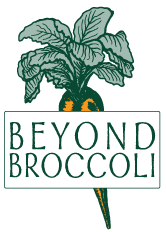“Life expectancy would increase by leaps and bounds if green vegetables smelled as good as bacon.”
– Gary Larson, The Far Side cartoonist
Despite the huge growth of farmer’s markets and apparent interest in better quality food over the past few years, we aren’t eating any more veggies now than we were a decade ago. Let’s face it, vegetables have an image problem. I’ve heard all the reasons so many times – not tasty enough, convenient enough, too expensive, too much work to prepare, take too much time to eat, etc.
Oh sure the farmer’s market crowd oohs and aahs over bundles of rainbow-colored Swiss Chard or fresh, crisp asparagus, but in general people aren’t sneaking out at night to the produce department to satisfy snack cravings. In fact last time I checked French fries were still the most commonly consumed vegetable in the U.S. (unless they are omitted from a particular survey in which case iceberg lettuce claims top spot).
So, this week I stumbled onto something potentially exciting in the vegetable world (at least for nutrition geeks like me) as I prepared to show my Food & Society class (the class I described in my last blog entry) an example of a sign of positive change.
There is a new PR campaign by “a bunch of carrot farmers” to promote baby carrots “like junk food.” (www.babycarrots.com) The $25 million dollar effort started last fall with vending machines in a few east coast high schools that dispense brightly colored packages of baby carrots available for just .50 cents.
Okay, even though $25 mill sounds impressive I realize it’s a mere pittance compared to the billions spent to promote fast and other junk food annually. It’s unlikely the fake orange cheese snack makers are trembling right now at the new orange crunchy snack kid in town. And yes, promoting more excessively (non-recyclable) packaged foods isn’t helping our landfills, nor are these conventionally grown veggies helping the causes of sustainable agriculture or a re-regionalized food system.
But, to reiterate one of my main themes these days, I am looking for signs of progress – not perfection (see previous rant related to Lunchables). As we simultaneously struggle to help people eat better for their health and to re-tool our food and agricultural systems for a more sustainable future, there is much work to do.
As we work to get junk food out of schools we need to replace it with something. Maybe baby carrots can blaze the vending machine trail for fresh snap peas, grape tomatoes, and colored bell pepper strips. Maybe for another quarter you can get a side of hummus or Ranch dressing to dip them in (increasing palatability for picky eaters).
We need to eat more vegetables. Kids need to eat more vegetables. We whine incessantly about the cost and inconvenience of vegetables and lament veggies’ lack of cachet in our modern food culture. (Though last fall in Manhattan an auction featuring heirloom vegetables was part of an event that raised over $250,000 for various charities!) Now enter “a bunch of carrot farmers” and some creative, savvy ad people and voila, baby carrots are getting a makeover.
The part I love about the ad campaign (aside from the prospect of getting more people to eat more carrots) is that it’s creative and fun. The campaign makes fun of commonly used advertising strategies – sexual innuendo, heavy metal music, violence, and politically incorrect (or at least suspect) language. There is a fun website (with LOUD and to my tastes obnoxious music), free iPhone app, Facebook and Twitter links, and downloadable labels you can attach to your own baby carrot bags (providing a more eco-friendly packaging option for those who wish to print on recycled paper and re-use their own baggies or containers).
I realize not everyone shares my enthusiasm for what seem like baby steps toward positive change. I hope however, that you appreciate there is no single answer to the many nutrition, food and health challenges we face. If baby carrots are suddenly in the hands of even a few hundred school kids in place of high fat, sugar and salt-laden snack foods, even if it isn’t everyday it’s a good thing.
“A fruit is a vegetable with looks and money. Plus, if you let fruit rot, it turns into wine, something Brussels sprouts never do.”
P. J. O’Rourke


